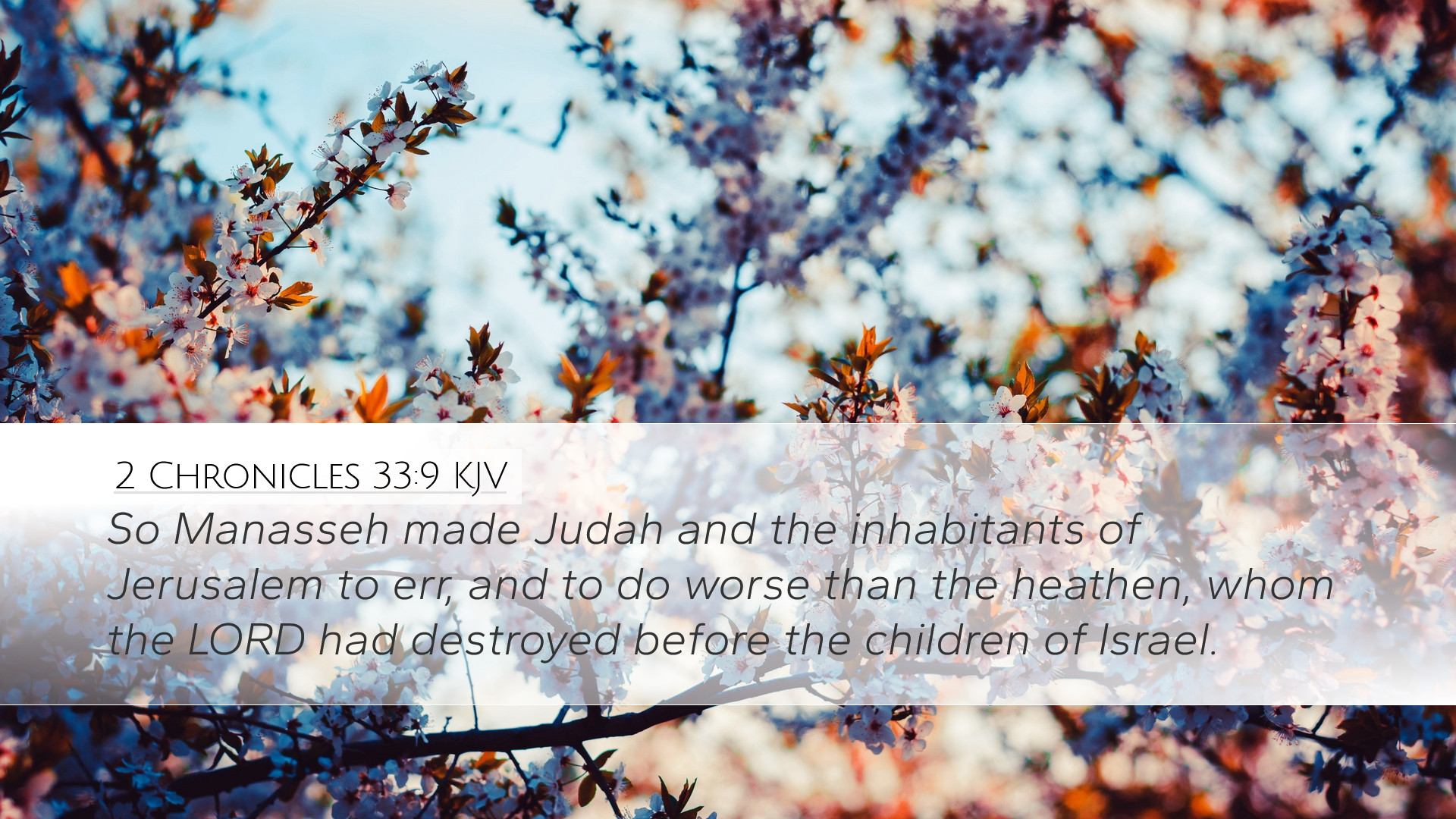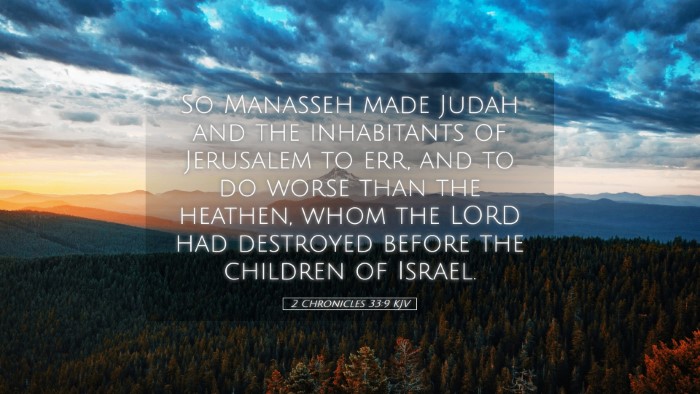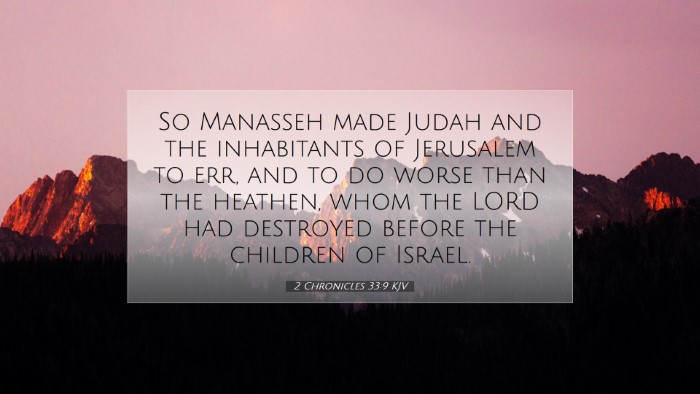Commentary on 2 Chronicles 33:9
Bible Verse: "So Manasseh made Judah and the inhabitants of Jerusalem to err, and to do worse than the heathen, whom the Lord had destroyed before the children of Israel."
Introduction
This verse encapsulates the tragic reign of Manasseh, one of the kings of Judah, known for his profound influence on the spiritual and moral direction of Israel. This commentary seeks to unravel the complexities of Manasseh's actions and their implications by drawing insights from esteemed Bible commentators such as Matthew Henry, Albert Barnes, and Adam Clarke.
Contextual Background
Manasseh’s reign is pivotal in understanding the historical and spiritual narrative of Judah. His ascension to the throne, as detailed throughout 2 Chronicles, marks a significant departure from the righteous path established by his father, Hezekiah. As noted by Matthew Henry, Manasseh’s reign lasted fifty-five years, during which he initiated practices that led the people of Judah into severe idolatry and immorality.
Analysis of Manasseh’s Influence
In this verse, we observe that Manasseh not only caused the people to err but also led them to perform actions worse than those of the heathen nations that God had previously eradicated. This point is echoed by Albert Barnes, who emphasizes that such a regression into sinfulness indicates a profound spiritual blindness and disobedience against God’s commands.
-
Idolatry:
Manasseh's reign is marked by a resurgence of idol worship. He reintroduced altars to Baal and Asherah poles, which were direct violations of the covenant established by Moses. Adam Clarke elaborates on these practices by stating that these actions reflected a direct challenge to God's authority over Israel.
-
Bloodshed:
The verse also implies that Manasseh's reign was characterized by violence and bloodshed, including the sacrifice of his own son (2 Kings 21:6). As Matthew Henry indicates, such actions led to a deep moral corruption among the people, who began to emulate these dark practices.
-
Spiritual Blindness:
Barnes points out that the people of Judah were led into spiritual infidelity and moral depravity to the extent that they became worse than the nations whom God had removed from the land. This corruption of character demonstrates a reversal of God’s intended purpose for Israel as a holy nation.
Consequences of Manasseh's Actions
The consequences of Manasseh's reign had significant implications for the nation of Judah. As highlighted by Clarke, a society that strays from divine guidance often reaps the fruit of its transgressions.
-
Divine Judgment:
Manasseh’s actions incited the anger of God, as they violated the covenant established with His people. This ultimately led to God's judgment upon Judah, as seen in the subsequent destruction and exile.
-
Spiritual Decline:
The near-total abandonment of Yahweh prompted a spiritual decline, as the people became desensitized to their sin. Matthew Henry asserts that this spiritual decline is often cyclical, where one generation's sin influences the next, leading to apostasy.
-
Restoration and Repentance:
Interestingly, even after such a reign of terror, Manasseh later sought repentance while in captivity. His restoration, as noted in 2 Chronicles 33:12-13, showcases God's mercy and the potential for redemption, though the damage inflicted upon Judah persisted.
Theological Implications
This verse showcases several key theological implications pertinent to contemporary believers, pastors, and theologians.
-
The Nature of Sin:
The verse serves as a stark reminder of the pervasive nature of sin and its capacity to lead people astray. As articulated by Barnes, man’s propensity to sin can lead to a greater moral decline if not checked by divine intervention.
-
God’s Sovereignty:
God's sovereign authority over nations and His ability to raise and remove leaders underscores His overarching plan. Henry remarks that despite human failure, God's purpose ultimately prevails in history.
-
Pursuit of Repentance:
The account of Manasseh’s later repentance offers hope for restoration, emphasizing God's readiness to forgive and restore, regardless of past transgressions. Clarke gives weight to the understanding that true repentance can lead to forgiveness and a new beginning.
Conclusion
2 Chronicles 33:9 serves as a profound cautionary tale regarding the influence of leadership on the spiritual direction of a nation. The life of Manasseh illustrates the dangers inherent in leading a nation away from God and the dire consequences that can ensue. Yet, it also highlights the incredible mercy of God, who, even in the face of gross transgression, offers paths to repentance and restoration. Thus, this passage significantly enriches our understanding of God’s nature, the reality of sin, and the ever-present possibility of redemption.


